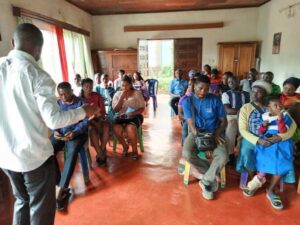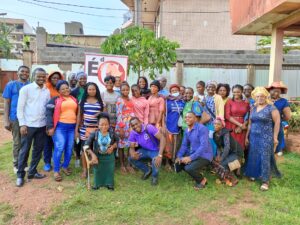Socio-economic training of IDPs Dschang, November 10, 2022
Association Action pour l’Economie de Communion en Afrique Centrale (AECAC): second phase of the project for the empowerment and socio-economic integration of IDPs in the Northwest and Southwest.
“Count your blessings one by one and you will be surprised at what the Lord has done for you!”
With this chorus, 25 young men and women internally displaced people (IDPs) from the crisis in the North West and South West regions living in Dschang and Bafoussam – West of Cameroon – started their training session on November 10, 2022 in Dschang.
To improve their situation, this project promoted by the Association Action pour l’Economie de Communion en Afrique Centrale (AECAC) proposes means for their empowerment and socio-economic insertion, so that they can take care of their vital needs.
 Why financial education and business management?
Why financial education and business management?
The crisis led many to abandon not only their homes and towns, but also their occupation. And arriving in their welcoming towns, they have to find means to sustain themselves and their families.
More specifically, the training focused on Internally Displaced Persons (IDPs) who already have skills in sewing, hairdressing, barbershops, shoe making and others.
The session started therefore with story sharing. Many touching stories were recounted on how they make a living.
A number of these stories were about keeping small businesses, how they got a capital to start off, and again how are these small businesses managed.
Kennedy studied building and construction, it’s not easy to find job on building sites, and he is ready to move to any town in the region where he finds a job. Derrick has a barber shop: “before the crisis I was at university. I had activities that helped me to cope. Before completing my studies the crisis broke out. I borrowed some money to open a barber shop. Now I wish I could have enough income to increase my business…”
Nives, a nurse by profession, left her hometown in 2017 to various destinations and now she lives in Dschang with her family. She would love very much to practice as a nurse but she can’t find a job. She does small business, she buys and sells crayfish.
Before the crisis Zefa was doing farming in his village, he was keeping pigs, now he sells fire wood in spite his health conditions and he is the caretakers of his family, he has 3 children.
Nicodemus is a carpenter: “before the crisis I was a student in Fontem, I had gone there to learn the work. When the crisis broke out, I came to Dschang and now I’m working in a carpentry shop of someone”. He also shared that since he does not get paid regularly, he would like to have a capital to start doing small works “to own a place of mine”. Sylviane was doing farming she now lives in Bafoussam with her family and she started selling some food provisions in her neighborhood. “Today I can keep 3000/4000 per day. I would like to enlarge my business”.
Sylviane was doing farming she now lives in Bafoussam with her family and she started selling some food provisions in her neighborhood. “Today I can keep 3000/4000 per day. I would like to enlarge my business”.
Through their moving and challenging stories the training took shape. The conversations – through questions and answers – gently and skillfully evolved into “training classes”. It is only then that the facilitators: Steve Azeumo, and Tiku Martin introduced the beneficiaries of this project, into the management of small businesses, financially accompanying them in their activities, on technical and psycho-social levels.
Success stories
The session ended with success stories of some beneficiaries of the first phase of the project.
Cyril lives in Yaoundé, during the first phase of the project he learned shoe-making. He now has a shop and he has a large customer community through social media. His mother too shared her moving story of how this job up to now, helps cater for the needs of the family.
Mary, a teacher by profession, lives in Dschang with her family. During the first phase of the project she learned a few skills: making soap and crocheting. To date, her market has expanded beyond Cameroon.
The session concluded successfully, with facilitators of the project gradually reaching the goal of the project to help the IDPs restored and regain their human dignity in their new environment.
Launching the beneficiaries into the deep and core foundation of the projects: communion! They were encouraged “to embark on the path of sharing not forgetting that God is our invisible partner, who calls each one of to build bonds of fraternity where ever we are, even as we struggle to make a living through small businesses”.
ABOUT US
AECAC ( Action for Economy of Communion in Central Africa )
- Registration
N°966/RDA/J06/SAAJP/BAPP - BUSINESS INCUBATOR, Approval of Cameroon Government: Ministry of Small and Medium-Sized Enterprises, Social Economy and Handicrafts
N°22/00046/D/MINPMEESA/SG/DAJ du 15 Juin 2022
ALL CONTACTS
Yaoundé- Omnisport
Town: Yaoundé- Cameroon
BP: 5682 Nlongkak
+237 696521171
secretariat@aecac.org
08 am - 05:30 pm Monday-Saturday
PAGES
- Home
- About us
- Projects on incubation
- Support our projects
- Contact
- Legal mention
© 2021 AECAC incubator
Made by Armand TEGOMO VOUKENG

Leave a Reply